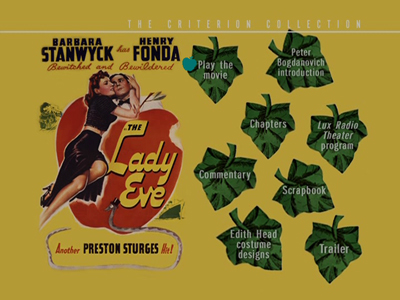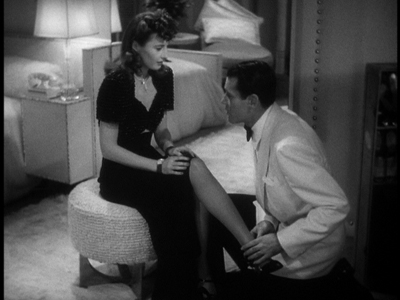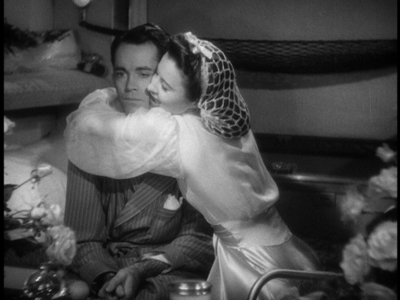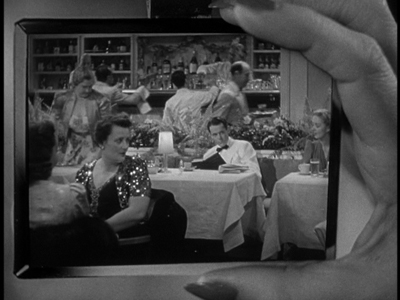
All is fair in love and war, and they call it the battle of the sexes for a reason. It just gets a little dicey when one of the brawling parties doesn't know they're in a fight.
In Preston Sturges's 1941 comedy The Lady Eve, the skirmish is between Jean (Barbara Stanwyck), the daughter and protégé of a con man, and Charles (Henry Fonda), the heir to a fortune in ale who'd rather canoodle with snakes than swill on brew. When Charles meets the ocean liner carrying Jean and her father, Colonel Harrington (Charles Coburn), the father/daughter team sets its sights on the target. As Charles keeps reminding them, he's been up river in the Amazon jungle for a year. He's a bundle of horny nerves waiting to be worked.

Just how un-level the playing field is comes clear during a card game. Toasting over brandy, the "Colonel" declares his drink in tribute to "Washington and Valley Forge!" Charles counters with, "Dewey and Manila!" But Jean offers, "Napoleon and Josephine!" They weren't fighters, they were lovers, but it's all the same to her. After all, this is the woman whose seduction technique is literally bringing her paramour to his knees. She trips Charles in the dining room, and when his tumble breaks her heel, she insists he escort her back to her cabin. There, she has him pick out what her replacement shoes will be and sits on a low cushion so that he can take the old pair off and put the new pair on. That way he has to stare up her lovely gams to look into her equally lovely eyes.

Preston Sturges was a master seducer, and not just in the way he brings Jean and Charles together, but also in how he draws the audience in. There's a negotiation technique where the party looking for the upper hand drops his or her voice low so the other person has to really listen in order to catch what is being said. It's a contrived intimacy that almost always works, and it pays off in spades for Sturges. The Lady Eve first attracts us with its witty dialogue and slapstick humor. It's loud and easy and appealing. But then Jean starts whispering to Charles, and he has to lean in to hear, and so do we, and pretty soon, we're all hooked.

The Lady Eve has some of the most intense flirting you're ever going to find in movies. When Stanwyck and Fonda lock eyes, they stay locked, nose to nose, breath to breath. They cuddle cheek to cheek, though once again imbalanced. Jean is in the chair, but clumsy Charles has fallen to the floor. She looks enraptured, he looks like he is in a panic. It's that year in the Amazon, the poor boy is about to burst. His head swims with her perfume, to the point Sturges even stages a POV shot, with director of photography Victor Milner shooting Barbara Stanwyck through the milky eyes of love. Charles's snake may be cold blooded, but the boy's all het up!
The plot here is told in three distinct acts, and not the made-up acts that most film critics cite willy nilly. (Seriously, pretty much any time we say "Third act," we just mean the part around the climax, we don't know where any break really is. Charlie Kaufman, where are you?) The boat is the first act, with Jean's con turning to true love, only to be burst when Charles finds out that she is a swindler. The second act is Jean's revenge. She works her way into Charles's home posing as British socialite Lady Eve Sidwich and seduces him all over again. The third act is how she bursts the marriage and how she then proceeds to clean up after herself and bring the con all the way around. (It's a romantic comedy, don't pretend you don't know where the lovers end up.) Throughout, Jean is slick and fluid, always on her toes and quick with a word; Charles, on the other hand, is slow, stiff, and dimwitted. You might almost miss how good Fonda is, his perfect straight-man routine gets eclipsed by Stanwyck's delectable temptress. Watch him on the train, though, when he tries to make peace. That forced smile is priceless!

He's also incredibly skilled at pratfalls, and Sturges puts him through many well-choreographed gags, including a triptych of tripping and spilling at the dinner party where he meets Eve. Sturges is probably best remembered for his rapid-fire banter and his meticulous control of his stock company. (Example: William Demarest, who later played Uncle Charlie on "My Three Sons," is in all the best Sturges movies, and is fantastic here as Charles's gruff valet.) His sense of comic timing and use of the frame also deserves some notice, however. There are many virtuoso scenes in The Lady Eve, starting with the masterful pan across the sea cruiser's passengers as they await Charles boarding. Each one has a line to say, and each line is funny, and Sturges knocks them down like shooting at cans on a rifle range. Then, once he has set up the atmosphere amongst the guests, he tilts the camera up, finding Jean and her cohorts on the deck above. This subtly reinforces an upstairs-downstairs dynamic that runs throughout the movie, not just showing the divide between proper society and the con men, but also the masters and the servants. There is one brief sequence in the Pike kitchen where a butler and a pastry chef argue over what to put on the cake that I wish had gone on forever, except if it had, we would not get the hilarious punctuation of the senior Mr. Pike (gravel-voiced bulldog Eugene Pallette) banging on pots and pans.


Before Jean first sends Charles heels over head, Sturges sets up a marvelous scene where she watches him in her pocket mirror, narrating his encounters with other eager women and even putting words in his mouth. Not only does Jean's pantomime of fixing her hair and make-up emphasize the female weaponry of a sex comedy, but the way we see Charles framed in the glass reinforces his role as a man being boxed in by his enemy, the improvised dialogue proving he is a puppet in her stageshow. Albeit a puppet with all the best jokes.


My favorite bit, though, comes on Charles and Eve/Jean's honeymoon. Jean waits until they are on the train to hatch her plan. For her ultimate vengeance, she is going to play Charles's jealousy in the same way she stoked the fires of his lust on the boat. Stir up your opponent's passions and you blind him in the fight. As Jean "accidentally" tells Charles of one lover after another, Sturges cuts away from their sleeping car to outside the train, starting with a sign instructing us to "watch your head." The locomotive goes through tunnels, it screams and howls and blows off steam--all symbols that cinema has traditionally used to signify sexual release. Here it is quite the opposite: it is sexual frustration!

One thing that struck me on this viewing of The Lady Eve (it must be at least my third or fourth) is that underneath the laughs and the genuinely romantic encounters, Sturges has utilized a plot that is decidedly film noir. In some ways, Charles Pike is trying to outrun a past he'd prefer not to be known for. He hates ale, and he would rather escape the business world (a stand-in for the naked streets) and estate living to hide deep in the jungle, the way a man on the lam often chooses rural life to avoid being seen by hoods and crooks that might recognize him. As the femme fatale, Jean is also trying to bury a past, and her dual role as the dark Salome and the more refined good girl is not atypical of the genre. Think Gene Tierney in Laura

Colonel Harrington at one point, pondering whether Charles will be the right kind of mark for their schemes, opines, "A mug is a mug in everything." This is a noirsih axiom, too, but it applies here to love. It makes mugs of us all, and in all things both Charles and Jean do, they end up right back in the same place--mug to mug. It's not such a bad way to go. Charles is the dupe that will inevitably end up in the arms of the woman, a victim to her con; Jean is the kind of woman just waiting to be...well, not tamed, but she's going to end up in the arms of the guy that at least inspires her to behave.* Like the snake Charles keeps in the box, Jean is never going to be neutralized or stay where she's told. She's going to escape from time to time, but she's never going to be too hard to catch again. What good is being in this kind of fight if you don't mix it up now and again? True warriors never really retire.
Especially as long as there is an audience to laugh along with them. Long may we guffaw!

* I initially considered writing this piece from the angle that this was an early incarnation of what got distorted into becoming the "manic pixie dream girl," and an example of what it could be if the modern filmmakers understood the dynamic of gutsy gal/mopey nerd better. Jean isn't crazy, there is no need to fix her, she's just got moxie.

No comments:
Post a Comment